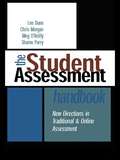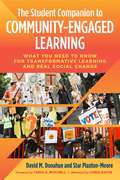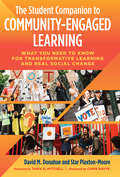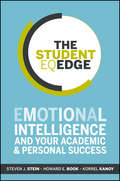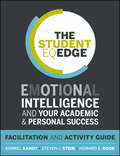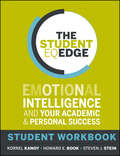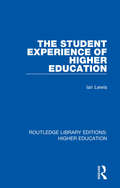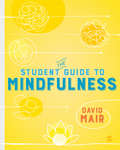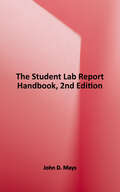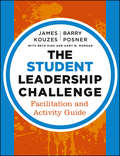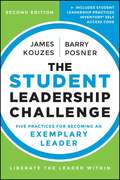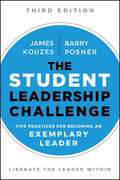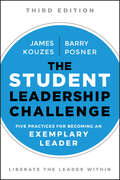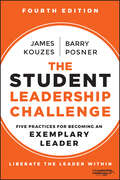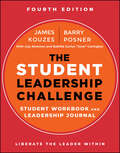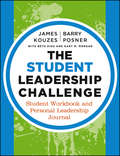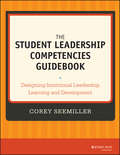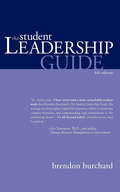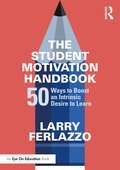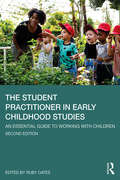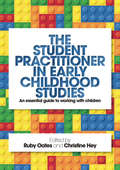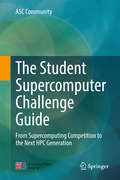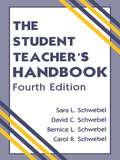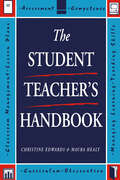- Table View
- List View
The Student Assessment Handbook: New Directions in Traditional and Online Assessment
by Chris Morgan Lee Dunn Meg O'Reilly Sharon ParryA guide to current practice in assessment, particularly for those professionals coming to terms with new pressures on their traditional teaching practices. Increased use of IT, flexible assessment methods and quality assurance all affect assessment, and the need to diversify and adapt traditional assessment practices to suit new modes of learning is clearer than ever.The Student Assessment Handbook looks at the effectiveness of traditional methods in the present day and provides guidelines on how these methods may be developed to suit today's teaching environments. It is a practical resource with case studies, reflection boxes and diagnostic tools to help the reader apply the principles to everyday teaching.The book provides advice on a wide range of topics including:* assessing to promote particular kinds of learning outcomes* using meaningful assessment techniques to assess large groups* the implications of flexible learning on timing and pacing of assessment* the pros and cons of online assessment* tackling Web plagiarism and the authentication of student work* mentoring assessment standards* assessing generic skills and quality assurance.
The Student Companion To Community-Engaged Learning: What You Need To Know For Transformative Learning And Real Social Change
by Tania D. Mitchell David M. Donahue Star Plaxton-Moore Chris NayveThis book is designed for students to read and reflect on independently or to foster discussion in class on their motivations and dispositions toward community engagement and service learning. It prepares students to work with diverse individuals, groups, and organizations that may be outside their prior experience. Faculty can use the book as a tool to deepen the educational experience of the course and enrich community engagement. <p><p> Students will discover through a process of reflection how service connects to personal development and the content of their courses, builds their ability to engage with people different from themselves, and develops new life skills, all in the context of working with communities to overcome systemic injustice. The book concludes with case studies of students who have experienced the transformative power of community-engaged learning.
The Student Companion to Community-Engaged Learning: What You Need to Know for Transformative Learning and Real Social Change
by David M. Donahue Star Plaxton-MooreThis compact, accessibly written text prepares students for their experience of community-based learning. It is designed for students to read and reflect on independently or to foster discussion in class on their motivations and dispositions toward community engagement and service learning. It prepares students to work with diverse individuals, groups, and organizations that may be outside their prior experience. Faculty can use the book as a tool to deepen the educational experience of the course and enrich community engagement. This text is a guide to what’s involved in community-engaged learning, from understanding the pervasiveness of social, economic and environmental problems, to learning about how individuals and organizations in communities work to overcome them. Students will discover through a process of reflection how service connects to personal development and the content of their courses, builds their ability to engage with people different from themselves, and develops new life skills, all in the context of working with communities to overcome systemic injustice.Critical questions woven into each chapter prompt students to reflect on ideas and perspectives about social justice, community development, and their role in fostering them.The book concludes with case studies of students who have experienced the transformative power of community-engaged learning. The stories illustrate common themes inherent in the student experience, including listening to understand, challenging stereotypes, learning the nature of their role, and seeing the world through a new lens.A special feature of this book is the embedded QR codes that provide access, as students read the text, to online resources, and original and public videos that explore particular themes or perspectives more deeply. The authors also include text directed to faculty to provide ideas about framing their community-engaged course and integrating the book.
The Student EQ Edge: Emotional Intelligence and Your Academic and Personal Success
by Steven J. Stein Korrel Kanoy Howard E. Book"The Student EQ Edge is more relevant today than any other time in the history of our world. Our opportunity to succeed in the 21st century will depend a great deal on our emotional intelligence in our transformation to lifelong learning and our leadership ability. This book is the competitive edge." —Stedman Graham, best-selling author, speaker, entrepreneur "We have been long aware that academic ability does not necessarily predict college success. This book provides a comprehensive look at emotional intelligence and the role it plays in student persistence. It takes these noncognitive aspects that we know really matter and puts them into a practical, user-friendly guide. This book is long overdue in higher education." —Catherine Andersen, master trainer in emotional intelligence; professor and special assistant to the provost for student success, Gallaudet University "As important as book learning is, we know that success in life is also dependent upon emotional intelligence. The authors of The Student EQ Edge define emotional intelligence and provide a road map for mastering emotional intelligence skills. I would highly recommend The Student EQ Edge to any high school or college student interested in knowing what it takes to be truly successful both inside and outside the classroom." —Brad Beacham, executive director, Sigma Nu Fraternity, Inc. "The Student EQ Edge is substantive, readable, and sure to appeal to students both in classes as well as those who are lucky to pick it up for personal development reading. The book is appealing because the research is understandable; numerous examples are integrated throughout, and readers are encouraged to apply what they are reading." —Dennis Roberts, assistant vice president for faculty and student services for the Qatar Foundation
The Student EQ Edge: Emotional Intelligence and Your Academic and Personal Success: Facilitation and Activity Guide
by Steven J. Stein Korrel Kanoy Howard E. BookTHE STUDENT EQEDGE Facilitation and Activity Guide This Facilitation and Activity Guide is a companion to the book The Student EQ Edge: Emotional Intelligence and Your Academic and Personal Success . It offers faculty and facilitators a hands-on resource for helping students reach their potential by tapping into the power of emotional intelligence. The Facilitation Guide includes exercises and activities which are designed to help students develop confidence, independence, the ability to set and meet goals, impulse control, social responsibility, problem-solving skills, stress tolerance, and much more—all of which help improve academic success. The Guide also contains a wealth of illustrative case studies, questions for student reflection, movie selections and TV shows that illustrate emotional intelligence, and a self-development plan. "The single best resource on emotional intelligence in student affairs, The Student EQ Edge: Student Workbook and Facilitation and Activity Guide are well organized, creative, and offer everything an emotional intelligence facilitator would need in a fast-paced student affairs environment. The examples are soundly constructed and resonate with students. These materials are my go-to resources."—Candice Johnston, associate director of student leadership and organizations, Wake Forest University"If I were building a new course to improve student success, it would be founded on emotional intelligence. All the instruction in the world on 'study skills' cannot touch the advantages that come to students who are able to manage their emotional intelligence. And the best news of all is that these skills can be taught. EQ skills make the difference." —Randy L. Swing, executive director, Association for Institutional Research "This Facilitation and Activity Guide is particularly useful, offering options from which the facilitator can draw in preparing assignments or learning community meetings. The focus on learners' needs, and particularly an authentic exploration of self and purpose, is practical yet has the potential to draw students to a deeper understanding of self that will draw them to high performance and contribution to others."—Dennis Roberts, assistant vice president for faculty and student services for the Qatar Foundation
The Student EQ Edge: Emotional Intelligence and Your Academic and Personal Success: Student Workbook
by Steven J. Stein Korrel Kanoy Howard E. BookTHE STUDENT EQEDGE STUDENT WORKBOOK The Student Workbook is a companion to the book The Student EQ Edge: Emotional Intelligence and Your Academic and Personal Success . The Workbook offers you a hands-on resource for gaining a clearer understanding of emotional intelligence and is filled with practical exercises for developing your emotional intelligence. Filled with case studies, self-assessments, activities around movie and television clips, and reflection and discussion questions, the Student Workbook will give you the skills and confidence you need in order to succeed in college and beyond. "Success in college is not just a matter of luck nor is it all about being the smartest person in class. The way you approach college matters. The great news in this book is that you can learn how to be successful in college and in your life beyond college."—Randy L. Swing, executive director, Association for Institutional Research "We have been long aware that academic ability does not necessarily predict college success. This book provides a comprehensive look at emotional intelligence and the role it plays in student persistence. It takes these noncognitive aspects that we know really matter and puts them into a practical, user-friendly guide. This book is long overdue in higher education."—Catherine Andersen, master trainer in emotional intelligence; professor and special assistant to the provost for student success, Gallaudet University
The Student Experience of Higher Education (Routledge Library Editions: Higher Education #16)
by Ian LewisOriginally published in 1984 The Student Experience of Higher Education provides a detailed analysis of the student experience, based on first hand discussion and observation. Information taken from interviews with a wide variety of students is used to explore the way in which new, overseas, and female physics students in particular experience university education and relates to their reactions to the organised learning which the university provides. The study focuses on an understanding of how various aspects of the official perspectives of academic staff contrive to limit the educational development of the undergraduate. This detailed picture of the university world is in contrast to previous methods of research in this area. By showing the benefits to be derived from an analysis of the experiences of students within one small campus based university this book is related to critical American studies previously unparalleled in the British university research tradition.
The Student Guide to Mindfulness (SAGE Study Skills Series)
by David MairDo you want to: Learn how to embed mindfulness in your everyday life? Understand how to manage feelings of anxiety or depression? Find a healthy balance between course work, job and social life? Face the future with a positive attitude? More than ever students are reporting high levels of stress, depression and loneliness while at university – so looking after your mental wellbeing is just as important as academic preparation. This book provides grounded guidance on how mindfulness can be used to cope with the main sources of anxiety while you are completing your studies, so you can find balance and make the most of student life. Combined with practical and recorded mindfulness exercises, learn how to master techniques and tools to reconnect with the present and yourself, and approach life at uni in a stress-free way.
The Student Guide to Mindfulness (SAGE Study Skills Series)
by David MairDo you want to: Learn how to embed mindfulness in your everyday life? Understand how to manage feelings of anxiety or depression? Find a healthy balance between course work, job and social life? Face the future with a positive attitude? More than ever students are reporting high levels of stress, depression and loneliness while at university – so looking after your mental wellbeing is just as important as academic preparation. This book provides grounded guidance on how mindfulness can be used to cope with the main sources of anxiety while you are completing your studies, so you can find balance and make the most of student life. Combined with practical and recorded mindfulness exercises, learn how to master techniques and tools to reconnect with the present and yourself, and approach life at uni in a stress-free way.
The Student Lab Report Handbook: A Guide to Content, Style, and Formatting for Effective Science Lab Reports
by John D. MaysThe Student Lab Report Handbook is a concise student resource to help learn how to prepare a premier lab report. Syntax, voice, tense, word choice, technical expression, data analysis, and error prediction are all discussed. This book is not specific to any discipline so it can be used with physics, biology, chemistry, or any other subject.
The Student Leadership Challenge: Facilitation and Activity Guide (J-B Leadership Challenge: Kouzes/Posner)
by James M. Kouzes Barry Z. Posner Gary M. Morgan Beth HighThis book gives educators the flexible, modularized building blocks for teaching students how to apply Kouzes and Posner's Five Practices of Exemplary Leadership. The guide includes language, guidance, and activities for teaching each Practice and its associated leadership behaviors, as well as tips for coaching students through their leadership development. It also includes direction on using the Student Leadership Practices Inventory, advice for working with students using the Student Workbook and Personal Leadership Journal, and curriculum suggestions for different educational contexts.
The Student Leadership Challenge: Five Practices For Becoming an Exemplary Leader (Second Edition)
by James M. Kouzes Barry Z. PosnerIn this updated and expanded second edition of The Student Leadership Challenge, James Kouzes and Barry Posner apply their extensive research and expertise to demonstrate that anyone can be a leader, regardless of age or experience. They challenge high school and undergraduate college students to examine their leadership actions and aspirations. Your students will learn from first-hand leadership stories from young leaders like themselves around the world, helping them to deeply understand and explore The Five Practices of Exemplary Leadership: Model the Way Inspire a Shared Vision Challenge the Process Enable Others to Act Encourage the Heart The book guides students through the concrete actions they can take to become exemplary leaders, from finding their voice and clarifying their values, to recognizing others' contributions and celebrating others' victories. The authors ask readers to reflect at the end of each chapter on their own leadership experiences and abilities now and for the future.
The Student Leadership Challenge: Five Practices for Becoming an Exemplary Leader (J-B Leadership Challenge: Kouzes/Posner Ser.)
by James M. Kouzes Barry Z. PosnerThe Student Leadership Practices Inventory" (Student LPI") is the cornerstone of The Five Practices of Exemplary Leadership* model. Created by leadership educators James M. Kouzes and Barry Z. Posner, this powerful leadership development model approaches leadership as a measurable, learnable, and teachable set of behaviors, because everyone can be a leader--whether in a designated leader¬ship role or not. The Student LPI offers you a method for accurately assessing your leadership skills based on The Five Practices of Exemplary Leadership8, by measuring the frequency with which you engage in thirty behaviors that research shows lead to the best leadership outcomes.
The Student Leadership Challenge: Five Practices for Becoming an Exemplary Leader (J-B Leadership Challenge: Kouzes/Posner)
by James M. Kouzes Barry Z. PosnerReal-world leadership training for real-world students The Student Leadership Challenge tailors one of the world’s most respected leadership models to students’ unique needs, and provides a proven pathway to success. Based on The Five Practices of Exemplary Leadership, this book merges solid research with personal stories from real-world student leaders to help students develop the critical skills they need to lead both now and after graduation. Useful from high school to graduate school and beyond, these lessons are reinforced by reflective and critical thinking activities to help students internalize important concepts while honestly assessing their own practices. Updated and expanded, this new third edition includes four extra chapters to allow deeper investigation, while broader, deeper, and more vivid examples from real-life students illustrate what student leadership looks like around the world. New discussion delves into the research behind the model, as well as the usefulness of leadership in the transition to post-graduate life. What does leadership mean to you? Although it may be difficult to put into words, we all know it when we see it. Effective leaders tend to exhibit a specific set of traits, possess certain skills, and practice particular habits. This book helps you hone your natural talents and shape your path to success as the leader you want to become. Learn The Five Practices of Leadership, and how they help you succeed beyond school Discover how students around the world are exhibiting the best in modern leadership Practice critical leadership techniques and engage in thought-provoking discussion Assess your own potential with the Student Leadership Practices Inventory Great leadership is more important than ever before, and students are in a prime position to develop these critical skills. The Student Leadership Challenge provides a comprehensive framework with real-world application to help students become their very best.
The Student Leadership Challenge: Five Practices for Becoming an Exemplary Leader (J-B Leadership Challenge: Kouzes/Posner)
by James M. Kouzes Barry Z. PosnerA brand new edition of the bestselling book that helps students and young people to develop critical leadership skills The Student Leadership Challenge is based on four decades of research on what people are doing when at their personal-best as leaders. With an approach tailored specifically to young and emerging leaders, this guide introduces The Five Practices of Exemplary Leadership operating system, incorporating stories of leadership development from real students, as well as reflective and critical thinking activities at the end of each chapter. Readers will have opportunities to engage in each of The Five Practices, building leadership skills that translate to real world applications. This fourth edition has been updated with new stories about topics critical to today's youth, including climate change, social justice, mental health, and virtual learning. Included with the book is access to the online Student Leadership Practices Inventory, so readers can achieve insight into their current leadership skills. Learn The Five Practices of Exemplary Leadership, and how they help you succeed while in school and in life Get inspired by stories of students around the world who exhibit exemplary leadership Practice critical leadership behaviors and engage in thought-provoking reflections Assess your own potential with the Student Leadership Practices Inventory As a result of reading and interacting with The Student Leadership Challenge, readers will emerge with a concrete leadership framework and new skills that they can take with them, wherever the future leads.
The Student Leadership Challenge: Student Workbook and Leadership Journal
by James M. Kouzes Barry Z. PosnerThe Student Leadership Challenge: Student Workbook and Leadership Journal is the companion to the bestselling leadership book for students and young people Designed to be used with The Student Leadership Challenge or the Student Leadership Practices Inventory, this workbook will help students go beyond theory and dive into leadership practice. The activities and worksheets inside will guide students in better understanding and embodying The Five Practices of Exemplary Leadership®. There is also a unit on taking, digesting, and understanding the cornerstone assessment of this program, the Student Leadership Practices Inventory. With the workbook's guidance, students can gain insight into their current leadership skills and identify areas for improvement. Then, they can work through content that helps them commit to and work continuously on their leadership development. The Student Leadership Challenge is based on four decades of research on what people do when at their personal best as leaders. Tailored specifically to young and emerging leaders, this Student Workbook and Leadership Journal builds leadership skills that translate to real-world applications. The fourth edition and the companion workbook have been updated with new stories about topics critical to today's youth, including climate change, social justice, mental health, and virtual learning. Student leaders using this workbook will: Put The Five Practices of Exemplary Leadership into action with exercises that will help them succeed in school and in life. Examine their current leadership skills and make a plan for becoming the best leader they can be. Practice critical leadership behaviors and engage in thought-provoking activities. Assess their own potential with the Student Leadership Practices Inventory. After working through The Student Leadership Challenge: Student Workbook and Leadership Journal, readers will emerge with leadership skills that they can take with them, wherever the future leads.
The Student Leadership Challenge: Student Workbook and Personal Leadership Journal (J-b Leadership Challenge: Kouzes/posner Ser.)
by James M. Kouzes Barry Z. Posner Gary M. Morgan Beth HighDesigned to be used with the The Student Leadership Challenge or the Student Leadership Practices Inventory, this workbook will help students go deeper into the actual practice of leadership, guiding them in better understanding and embodying The Five Practices of Exemplary Leadership in a meaningful and relevant way. It includes activities and worksheets; a unit on taking, digesting, and understanding the Student Leadership Practices Inventory; and a section that helps students commit to and work on their leadership development in an ongoing way.
The Student Leadership Competencies Guidebook: Designing Intentional Leadership Learning and Development
by Corey SeemillerBridge the gap between leadership development and career preparation!This guidebook gives leadership educators the tools they need to help students develop the competencies necessary for their chosen careers and required by their academic programs. It also offers a way to understand and demonstrate the effectiveness of leadership programs. Organized into chapters each focused on one of 60 leadership competencies common across 522 academic degree programs accredited by 97 agencies, each chapter covers: a definition and description of the competency through the lens of each of four dimensions: knowledge, value, ability, and behavior; a scenario related to college student leadership that showcases the competency in action; related competencies to help readers understand how developing one competency may also intentionally or unintentionally develop another; a correlation of the competency to the Relational Leadership Model, the Social Change Model, the Five Practices of Exemplary Leadership, and/or Emotionally Intelligent Leadership; and tangible curricular ideas to use with students to help them develop each dimension of the competency.
The Student Leadership Guide
by Brendon BurchardExperts Academy Press is proud to present the first and only leadership book on the market that is (1) intended for students, (2) written from both theoretical and popular viewpoints, and (3) structured with a real-world, service-oriented framework that students can instantly use to make a difference in their classrooms, communities, and early careers. Leadership is conceptualized from the principles that it is a collective and participative process, different from management, and firmly rooted in service. The book's framework--Envision, Enlist, Embody, Empower, Evaluate, and Encourage--reflects six key leadership practices students must learn in order to lead with competence and confidence. The Student Leadership Guide has been praised by educators and students alike for its theory-backed content and its practical, inspiring call to action and service.
The Student Motivation Handbook: 50 Ways to Boost an Intrinsic Desire to Learn
by Larry FerlazzoEven with the highest-quality content, students who don’t have an intrinsic motivation to learn may never perform to their full potential. So how can we create the classroom conditions where that motivation can flourish? Renowned educator Larry Ferlazzo has the answers in this comprehensive new resource. Designed as a practical handbook you can easily refer to again and again for ideas, the book offers 50 teaching practices divided into four main sections: autonomy, competency, relatedness, and relevance. Throughout, there are tip boxes with links to resources for additional support, as well as lists of questions you can ask yourself to ensure you’re implementing the strategies in a culturally responsive way. With this book as your compass, you’ll be able to create the conditions for students to find their inner motivation, be their true selves, and thrive in school and beyond.
The Student Practitioner in Early Childhood Studies: An Essential Guide to Working with Children
by Ruby OatesNow in a fully updated second edition, The Student Practitioner in Early Childhood Studies provides accessible support and guidance for early childhood studies students in higher education who may have little, if any, experience of relating to young children in the early years foundation stage (EYFS) and key stage 1. With useful chapter summaries, activities and reflection points to help readers track their academic journey, this text draws on the experiences of students on the degree programme for the benefit of students new to practice. This fully updated second edition includes two new chapters on 'The inclusive practitioner' and 'The safeguarding practitioner'. It will: prepare students for the challenges of practice provide a synthesis of academic knowledge and practice skills develop students' critically reflective and creative thinking and understanding of early childhood pedagogy and the needs of young children provide the emerging student practitioner in higher education with knowledge, skills, understanding and confidence to relate effectively with young children and adults in the early childhood setting. Fully supporting students' practice experience and development of their critical and creative thinking, this book helpfully synthesises theory and practice in an applied and evaluative manner. The authors cover a range of themes including critical reflection, early childhood pedagogy, confidence building, communication skills, personal and professional development and employability alongside academic writing and research skills. This textbook is essential reading for students on all early childhood studies degree programmes.
The Student Practitioner in Early Childhood Studies: An essential guide to working with children
by Ruby Oates Christine HeyThe Student Practitioner in Early Childhood Studies: An essential guide to working with children provides accessible support and guidance for Early Childhood Studies students in higher education who may have little, if any, experience of relating to young children in the Early Years Foundation Stage and Key Stage One. With useful chapter summaries, activities and reflection points to help readers track their academic journey, this text draws on the experiences of students on the degree programme for the benefit of students new to practice. It will: prepare students for the challenges of practice provide a synthesis of academic knowledge and practice skills develop students' critically reflective thinking and understanding relational pedagogy and the needs of young children provide the emerging student practitioner in higher education with knowledge, skills, understanding and confidence to relate effectively with young children and adults in settings Fully supporting students' practice experience and development of their critical thinking, this helpful book synthesises theory and practice in an applied and critical manner. The authors cover a range of themes including critical reflection, relational pedagogy, confidence building, communication skills, personal and professional development and employability alongside academic writing and research skills. This textbook is essential reading for students on all Early Childhood degree programmes.
The Student Supercomputer Challenge Guide
by Asc CommunityThis guide provides a comprehensive overview of High Performance Computing (HPC) to equip students with a full skill set including cluster setup, network selection, and a background of supercomputing competitions. It covers the system, architecture, evaluating approaches, and other practical supercomputing techniques. As the world’s largest supercomputing hackathon, the ASC Student Supercomputer Challenge has attracted a growing number of new talent to supercomputing and has greatly promoted communications in the global HPC community. Enclosed in this book, readers will also find how to analyze and optimize supercomputing systems and applications in real science and engineering cases.
The Student Teacher's Handbook
by Bernice L. Schwebel Carol R. Schwebel David C. SchwebelThe Student Teacher's Handbook, Fourth Edition is a practical, user-friendly text that employs scientific research, sound advice, and student journal entries to encourage, sustain, and challenge the readers to function at their best during the crucial days of student teaching. Their needs--both professional and personal--during this stressful period guide the book's content. Student teachers' relationships--with students, cooperating teachers, and supervisors--are seen as being at the core of their teaching assignment. The authors draw on research in education and psychology that has practical application in the classroom and that helps student teachers cope with some of the tough problems connected with classroom management, including maintaining order and motivating students to learn. The book features: *practical, step-by-step assistance in helping student teachers make the most of their experience; *inclusion of the voices of many real student teachers who describe their difficulties and frustration--and how they overcome them; *in-depth discussion of the ways in which student teachers can make best use of cooperating teachers and university supervisors; *advice on making a smooth and successful transition from student teacher to teacher; and *attention to cutting-edge issues, such as multicultural education, effective use of technology, psychologically-appropriate methods of discipline, parent involvement in children's education, relevant education law, and other issues that challenge teachers at all levels. New in the fourth edition: *This popular text has been thoroughly updated and reorganized to eliminate repetition and make for a tighter narrative. *Increased attention has been given to the uses of technology in the classroom and to the pressures of school- or state-wide testing. *This edition includes additional journal entries from student teachers working at the middle and high school level, an expanded critical issues section, a refined description of problem-solving methods, and an updated discussion of multicultural education issues. This is an ideal text for the student teaching seminar at all levels of primary and secondary education, as well as a valuable resource for professors supervising student teachers and cooperating classroom teachers.
The Student Teacher's Handbook
by Edwards, Chris Healy, MauraFirst Published in 1994. Provides guidance and support to students on teacher training courses. Structured around an assessment profile, the text shows readers how to plan and manage their learning by identifying the range of skills they need to acquire in order to gained qualified teacher status.
